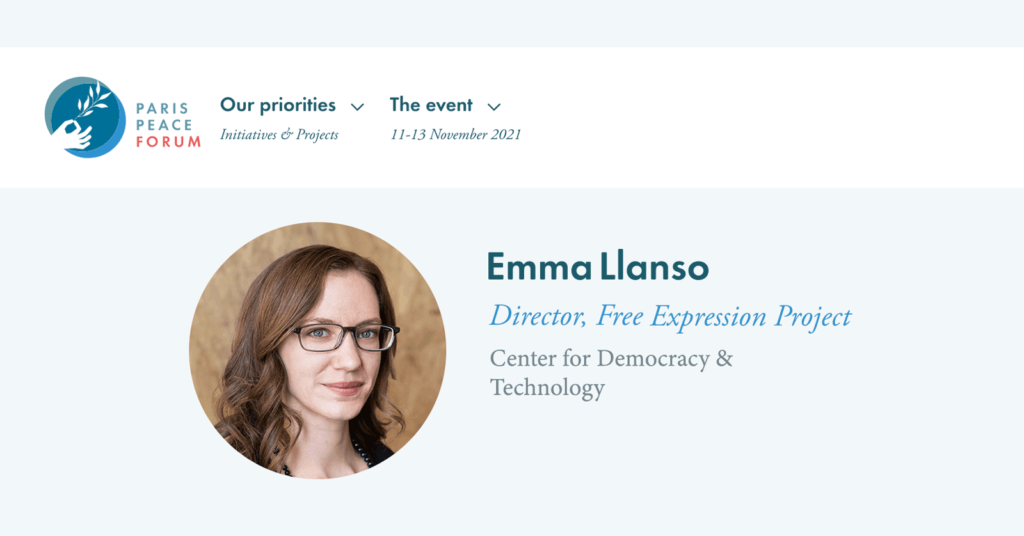Emma Llansó’s Remarks before the 2021 Paris Peace Forum

Introduction
Good afternoon, good evening, and thank you for inviting me to speak with you today. I am deeply honored to share the virtual dais with such distinguished speakers. I regret that I cannot be there in person with you all.
My name is Emma Llansó and I am a lawyer and human rights advocate specializing in freedom of expression online. I direct the Free Expression Project at the Center for Democracy & Technology, a non-governmental human rights organization based in Washington, DC and Brussels, with over 25 years of experience advocating for digital rights and the open Internet.
I am also a member of the Christchurch Call Advisory Network, and a variety of other networks and coalitions aimed at protecting human rights while tackling difficult challenges in our online ecosystem.
Importance of MSH Initiatives
A common theme across these efforts is the importance of multistakeholder (MSH) initiatives.
The word “multistakeholder” does not easily roll off the tongue, but it stands for a vital concept in Internet policymaking: that policy must incorporate the expertise, perspective, and experience of a broad range of stakeholders, including civil society, human rights defenders, technical experts and academics, government actors, and members of industry.
It is only with all of these perspectives at the table, able to meaningfully contribute both to agenda-setting and to policy development, that we can work towards policy solutions to difficult problems that are technically feasible and that protect and promote human rights.
The Christchurch Call Advisory Network
We have seen this demonstrated in the Christchurch Call process:
- The original Christchurch Call to Action was launched with a call for “action and enhanced cooperation among the wide range” of stakeholders necessary to combat terrorist use of the Internet.
- Much of the original deliberation around the Call to Action, however, was primarily between governments and companies, and civil society groups from around the world raised deep concerns about the lack of meaningful involvement from human rights advocates, technical experts, and especially those advocates who represent the communities most affected by terrorism, and most affected by the consequences of counter-terrorism policies.
- Fortunately, the government leaders of the Christchurch Call, from the governments of New Zealand and of France, heard these concerns and responded with a sincere and sustained effort to work with civil society and establish an Advisory Network to be integrated into the on-going work of the call.
- The civil society Christchurch Call Advisory Network now has regular meetings with representatives of the New Zealand and French governments who are tasked with implementing the Call. We are able to exchange ideas and perspectives on developments in the work to combat terrorist use of the Internet, and have been engaged in developing the work plans for continuing to implement the important aims of the Call.
- The Advisory Network has also organized ourselves, ensuring that our work can operate in a transparent and equitable manner, and securing resources to support and enable participation of a broad range of organizations and advocates.
Challenges and Opportunities for Protecting Human Rights Online
There is still much more that can be done within the structure of the Christchurch Call. I would highlight, in particular, the need for more robust engagement with the various governmental signatories to the call. Many governments who are members of the Call have considered and adopted counter-terrorism legislation in the past few years. Many of these legislative efforts have raised significant concerns among civil society, for:
- the threats they may create to free expression online through the imposition of filtering requirements and short time-frames for content removal,
- The risks they can pose to privacy of individuals, by requiring reporting of online activity to law enforcement and undermining people’s ability to access and use strong, end-to-end encrypted services,
- And the potential for counter-terrorism policies to stigmatize and to subject to disproportionate and unwarranted scrutiny, the vulnerable and already marginalized groups and communities in our societies, many of whom are themselves targets of terrorist activity.
Such provisions are inconsistent with the commitments governments have made in the Christchurch Call to act “without compromising human rights and fundamental freedoms”. So I would invite all signatories of the Call, and indeed all participants here today, to understand that there is a resource available to them, in the Advisory Network, that stands ready to help them identify and avoid such human rights risks in their counter-terrorism policies.
Lessons Learned
I would leave participants in this discussion today with a few lessons we have learned from the Christchurch Call Advisory Network and other multistakeholder initiatives. First, meaningful engagement of civil society, technical experts, academics, and other stakeholders should be a component of initiatives from the very beginning.
Further, there are a variety of fora that have already put in the difficult work of establishing operating procedures and getting underway. It is easy to underestimate the sheer amount of time it can take to establish a workable multistakeholder venue, and governments and others are strongly encouraged to look to existing initiatives, rather than to further attenuate the scarce time and material resources of civil society participants.
Finally: the purpose of these initiatives must remain squarely focused on protecting and promoting human rights and preserving an open, interconnected Internet that supports the enjoyment of human rights of all people around the world. The challenges that we face are not easy, and do not have simple answers or technical quick-fixes. But by working together, building on the important work that has already been done, and keeping human rights as the foundation of everything we do, I believe we can achieve an open, accessible Internet that empowers individuals and communities, provides robust online civic spaces, and supports healthy and thriving democracies around the world.
Thank you.


